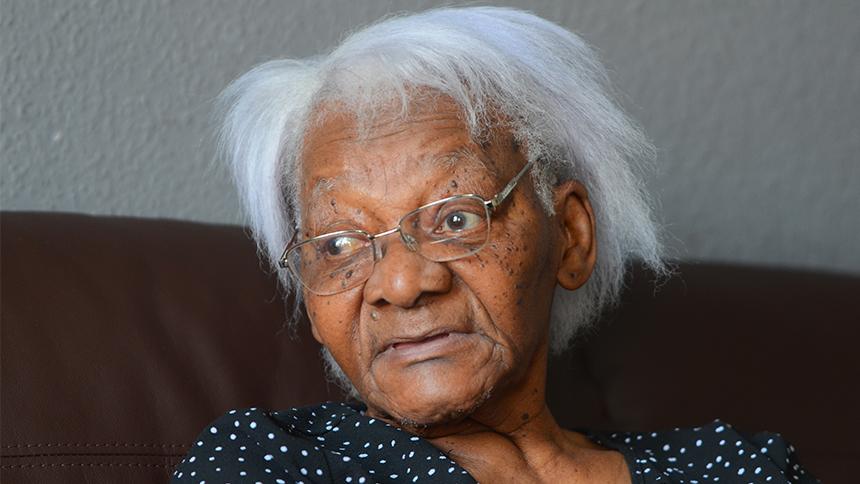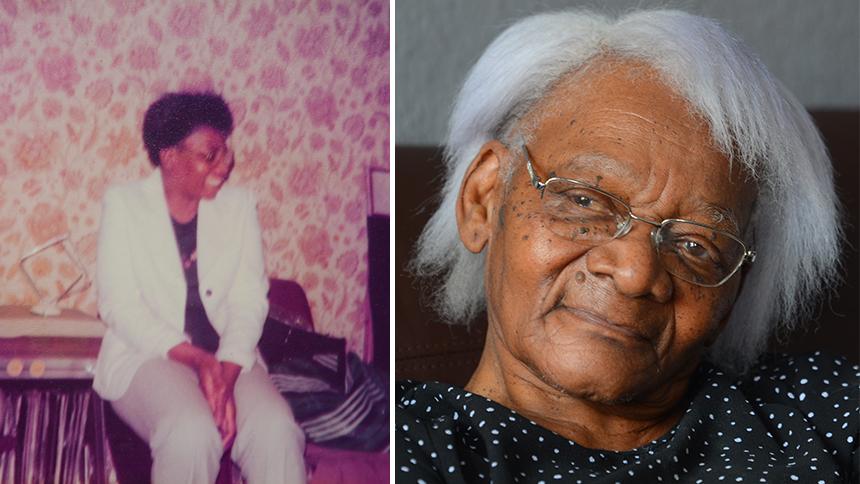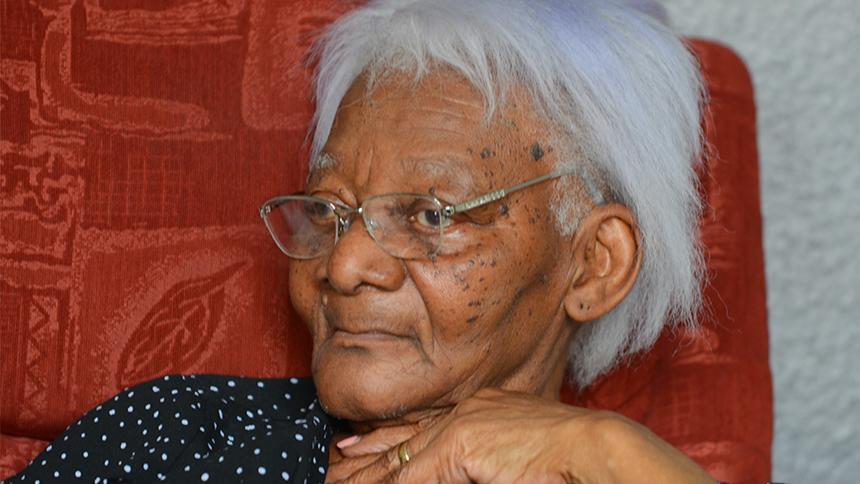Connie, who has dementia, recalls a full life from Grenada in the Caribbean to England
Connie Hall has enjoyed a varied life of rich and unique experiences, and says she has no time for hate.
Connie Hall remembers the moment in the mid-1950s that her then-husband suggested they move to England from their home in Grenada, in the Caribbean.
‘My daughter was being christened and somebody said they’re asking for people to come to England to work,’ she says.
‘I said to my husband that it was a good idea, but our daughter is only a few weeks old. I’m not leaving my kids to go anywhere!’
Connie, who is 90 in November, made the move to Middlesbrough a year later, and now lives in Chiswick in west London. She has four children, 11 grandchildren and many more great-grandchildren, as well as a lifetime of stories and experiences.
However, her dementia diagnosis and worsening memory have also brought sadness, worry and many challenges.

Nice people
Some of Connie’s strongest memories from her life in Grenada are of the people she grew up around.
‘I can’t forget the people in my young days, they was very nice,’ she says. ‘Everybody was nice to each other, there was no swearing.
‘They would help each other, nobody ever said no. My neighbour’s kids went to the same school as me, so she’d pick us up. There were very nice people in those days.’
Connie also remembers spending hours working in the garden.
‘I miss my garden terrible,’ she says. ‘I really loved gardening.’
Her family owned farmland and animals, including cattle and goats, and grew their own produce.
‘We didn’t buy food, we just grew it ourselves,’ she says. ‘We had mango trees and grew watermelon and a lot of bananas. The only food I didn't like was breadfruit.’
On the buses
Connie arrived in England with her two children around 1957, in her mid-20s, following her husband who was working in Middlesbrough as a motor mechanic. They later had two more children, both born in England, including daughter Sharon, who now lives with Connie.
‘Middlesbrough was wet and cold! Especially at nighttime,’ says Connie, who found work through a contact of her husband’s.
‘He was working with a fella called Tony, who asked me what did I do when the kids go to school,’ she says. ‘He asked me if I could make tea for the people waiting to buy cars. I did that for a long time.’
Connie later saw an advertisement for people to work on the buses.
‘I thought, “I’d love to be a bus conductor!”’ she says. ‘People were thinking that I wouldn’t do it, but I applied, went for the test – oh blimey, I can see myself now!’

Street attack
Although many people in Middlesbrough were nice to her, Connie and her family also experienced a lot of racism.
‘My husband used to go to work at night, and a load of young boys grab him to fight. I’d never forget that,’ says Connie, who recalls other young white people stepping in to help.
‘They said, “That’s Mr Hall, leave him alone!”’
Connie’s daughter Sharon says she had a ‘horrible’ time at school, while Connie also remembers the reaction of her new colleagues when she went for her bus conductor training.
‘You see people pulling their hands away,’ she says, miming the action of someone drawing their arms back sharply.
Connie developed good relationships with her colleagues and was even featured in a local newspaper article in the mid-1970s.
‘They came to my house and asked me a lot of questions,’ says Connie, who didn’t give too much thought to being the only Black employee. ‘I never used to look at it that way,’ she says.
Connie and Sharon also remember the Middlesbrough FC team coach breaking down near their house, and some of the players coming in for refreshments while new transport was arranged.
Among the group was the famous Jack Charlton, manager of the team.
‘I remember that man, he sent a present for me,’ says Connie. ‘I don’t know much about football, because in Grenada they play cricket.’
London life
Sharon later moved to London, and Connie followed, living in Northolt in the west of the city. She worked in catering for the police, in station kitchens in Hounslow, Ealing and Chiswick.
‘You’d order the stuff, price the stuff, you have to do the bookwork. I liked it,’ she says. ‘The police would sometimes pick me up or take me home.’
More recently, Connie has enjoyed some other celebrity encounters, meeting politician Ken Livingstone at an event at Kew Gardens, and Mayor of London Sadiq Khan through another organised by Alzheimer’s Society.
Fast and furious
A few years ago, Connie was diagnosed as being in the early stages of dementia.
‘Lately, I forget things quite a lot,’ she says. ‘The doctors say I have dementia, but nobody can tell me what caused it.’
Connie says she forgets things like names and places, while a strategy to help her remember hasn’t worked so well.
‘I write down somebody’s name on a piece of paper, but I forget about the papers!’ she says.
Connie says it can be difficult talking about her dementia.
‘It’s a bit sad to think about – I get maybe a bit sad about it,’ she says. ‘You forget this and you forget that.’
Sharon says that Connie’s dementia has been ‘worse’ since lockdown and ‘wasn’t this bad before’. She says it is affecting Connie’s behaviour as well as memory.
‘She thinks the TV can see her, so she won’t get dressed or undressed in front of it,’ says Sharon. ‘There have also been a few violent outbursts, and once there was really bad confusion – you could feel it.
‘It’s getting fast and furious now, which is sad, because she’s so physically fit for 89.’

Favourite song
Connie used to regularly attend local Age Concern groups, which stopped during the pandemic.
‘People there are laughing and having jokes and things like this,’ she says. ‘When they ask what would you like to hear, I say Oh Carolina – my favourite song. But I haven’t been there for a long time now.’
Connie also went out and about with volunteer Sue, who Alzheimer’s Society put her in touch with.
During the pandemic Sue has kept in regular contact by phone, which Connie has enjoyed, particularly as she doesn’t feel so confident about leaving the house at the moment.
‘Because of the thing we’re in now – the COVID – I don’t fancy going out,’ says Connie, who has had both of her COVID vaccinations.
Extra help
Sharon is her mum’s main carer, and Connie acknowledges her support.
‘Sharon do everything!’ she laughs. ‘I need the extra help. The worst was the kettle – I burned the kettle on the gas. It makes me worried.’
Sharon also supports her sister, who has a brain injury, though she won’t leave Connie on her own for too long.
‘The social workers said they’ll give someone to sit with Mum, but it hasn’t happened yet,’ says Sharon. ‘I don’t think you get enough help to look after someone.’
Asked how she feels about her life now, Connie immediately thinks of her old friends who have sadly died.
‘Life is OK. That’s all I can say. What can I do?’ she says. ‘The three best friends I have are gone.’
As she reflects on her many achievements and rich experiences, Connie shares one of her most important values.
‘I’ll never say I hate this person, or things like that,’ she says. ‘I haven’t got time to hate anybody.’
Need dementia support?
If you or someone you know are worried about or affected by dementia, we are here for you.


Denise Selwood
saysThis is so wonderful. Me my gran and my dad also came from Grenada. My dad was one of those people that was ask to come and work from Grenada. My gran who was his mum brought me up. In 1962 my dad sent for me and my gran. I went to school here. I hot married here. Even went back to Grenada after I had my kids and got married. I brought them there to show them where I was born. And where I lived. My gran also had plantation. Which she grew cocoa. Sugar cane. Mango trees and lots of other things I also remember we had pigs and goats. And I learned how to look after them. Also we had chickens. And like Connie said as a child over there you never swore and you had respect for your elders. And always said good morning or evening to them. Some of my kids that went there for a while. When there were young says the same thing. One of them who has kids says if she had the money she would send them their to live so they can learn some manners. My family from Grenada. Is the Joseph's from a place called st David's but we had more family all over the islands. Which was Thomas. Sylvester. Morgan. And more. So I know where Connie is comming from when she talks about Grenada. And commi g to live here. My name was Denise Joseph. It's now Denise Selwood. And I live in Reading. Berkshire.
England.
Robbie Barnard-Clare
saysI used to support Connie as part of my Community Support Work for Hounslow Alzheimer's Society. I tried to get her to share her story and effervescent personality for a year to no avail!!!
I remember Fats Domino ('Blueberry Hill') and endless games of dominos. Some of the happiest moments I have at the Society are conversing with Connie and listening to her stories. What a star!
Martin Corrick
saysMany thanks for Connie's inspiring story! It made me sit up and get on with things, rather than feeling sorry for myself - if she can do it, so can I!